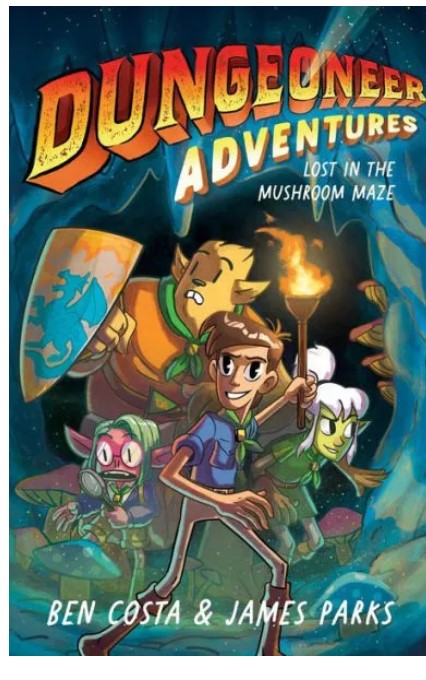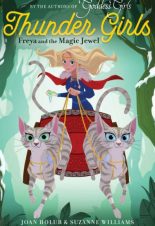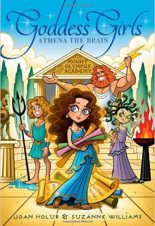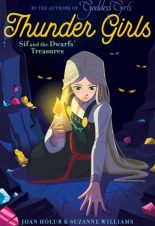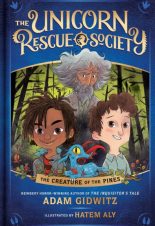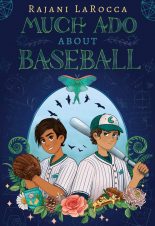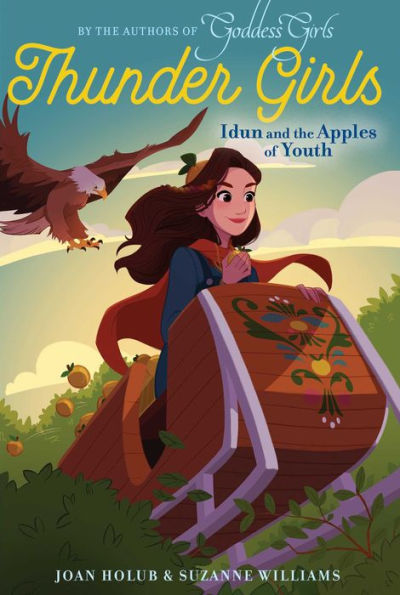
Buy This Book Buy This Series
“Speaking up for yourself isn’t necessarily selfish,” Freya. –Idun and the Apples of Youth
Idun and the Apples of Youth
Thunder Girls #3
by Joan Holub & Suzanne Williams
8+
Score
4.6
240
Twelve-year-old Idun is confident that she can take care of the apples of youth–the magical and delicious golden apples that keep all of Asgard Academy’s gods and goddesses healthy and young. But when it comes to sharing her thoughts, Idun feels insecure. Instead, Idun keeps her feelings hidden inside.
When Loki makes a deal with a giant disguised as an eagle, Idun must figure out how to save herself and her magical orchards. How can Idun save the apples of youth so the gods and goddesses don’t age?
Readers will relate to Idun’s conflict: she isn’t sure when it’s best to share her thoughts or keep them secret. Instead of telling others what she thinks, she often stays silent, which causes her to feel hurt and unhappy. Although the conflict is relatable, the story’s plot is choppy and follows the same format as the previous book. Predictably, Loki is “a worm in a rotten apple” and causes the disappearance of the apples of youth. The only surprise is that any goddessgirl would trust Loki not to betray her.
Idun and the Apples of Youth is full of fun apple puns, surprising shapeshifting, and a crush-worthy boy-god. When the apples of youth disappear, everyone begins to age, which brings in some silly situations that will make readers smile. Through her experiences, Idun learns that “speaking up for yourself isn’t necessarily selfish.”
The Thunder Girls series does not need to be read in order; however, readers who are unfamiliar with Norse mythology will want to read the glossary first. The easy-to-read story will keep younger readers entertained as a new villain flies into the picture and traps Idun. Even when Idun is in a perilous situation, she doesn’t sit around waiting for someone to save her.
Readers interested in mythology but who aren’t ready to tackle the Percy Jackson series will enjoy the Thunder Girls series. Interesting characters, fashion, and just the right amount of blush-worthy scenes will keep readers interested until the very end.
Sexual Content
- A boy might like Idun. “As far as she knew, no boy had ever crushed on her before. The idea that Bragi might like-like her sent a jumble of emotions surging through her—shyness and panic, but also a little thrill of excitement.”
- Bragi tells Idun, “It’s kind of true that I like you. I mean, like-like you. . .You don’t have to say anything. I just wanted you to know, that’s all.” Idun tells Bragi, “I like you, too.” Then she thinks that she “needed to think about what he’d told her for a while. If a crush was destined to happen between them, it would unfold in its own good time. No rush.”
Violence
- While walking from a mall in the human world to the school, Idun stops to help a creature. “The creature whipped around to stare at her with its tiny eyes. . . ‘I’ve already found what I was looking for!’ it crowed. ‘Four tasty students! Ringy-ding-ding! And rooty-toot-toots! I’ll grind your bones and steal your boots!’” The girls run from the creature.
- The large painted friezes that covered a wall come to life. The warriors in the friezes begin to attack. “With resounding battle cries, sculpted warriors hurled food across the room at foes on opposite walls. They grabbed turnips, carrots, potatoes, apples, bread rolls, and whatever else they found for ammo within their paintings.” The food fight lasts for three pages.
- While on a skiing tip, Loki meets a giant eagle that is fixing a pot of soup. When the eagle begins drinking the soup, Loki yells at him to stop. Loki grabs a ladle and swings it at the eagle. “With one clawed foot, he [the eagle] grabbed the bowl end of the ladle as Loki swung it at him again. As Loki held fast to the handle end, the eagle chanted some sort of magic spell that went like this: ‘Deaked leadked geak!’’’ Loki is unable to drop the ladle, and the eagle flies off with Loki hanging off the ladle. Bragi and Honir ran outside and “they scooped up rocks from the ground and threw them at the eagle, trying to make it let loose of Loki. . . Much to Bragi’s surprise, as he was pondering various schemes, the eagle suddenly released Loki. Oomph! Loki fell flat on his back in the powdery snow.”
- Loki and Idun plant apple seeds in Midgard. While planting, an eagle “came swooping from the trees toward them. ‘Whoa! Wait!’ yelled Idun as it seized her, hooking one of its claws in the back of her hangerock. At the same time, it lifted the handle of her half-full eski with its other claws.” When Idun yells for help, Loki runs away. The eagle takes Idun captive and locks her in a pantry.
- Loki, who shapeshifted into a falcon, tries to fly Idun back to the school. When they are close, they see that the students pile sticks and shavings outside the wall. “Luckily, someone managed to strike flint and spark a fire just as she and the falcon dove over the wall. Whoosh! Flames shot up the very instant they were safely past. Hot on their tail, Thiazi the eagle-giant tried to pull back in time to dodge the fire. But without success. Pzzt!” When the eagle-giant saw Thor on the wall, he flew away.
Drugs and Alcohol
- None
Language
- “Ymir’s eyeballs,” “Ymir’s nose,” and “Ymir’s elbows” are used as an exclamation. “Ymir was a frost giant who’d lived at the beginning of time. Slain by gods, his various body parts had been used to grown the nine worlds. And for some reason, everyone spoke of those body parts as slang.”
- Loki calls a boy a loser.
Supernatural
- Idun and her roommates go into a shop that has clothes that talk. When Freya puts on a cloak, she shapeshifts into a bird. When Freya puts the cloak on, “the new cloak tightened around her. Wings opened up from its sides. . . Freya took to the sky, her legs and booted feet becoming claws, and her head becoming that of a falcon with a sharp hooked beak.”
- While planting apple seeds, he says a spell to help them grow. “Grow, little seeds. Sprout and blossom. May whatever you bear be healthy and awesome.”
- When Idun is kidnapped, the students at the school no longer have the magical apples to keep them young. The students begin aging; this includes getting wrinkles, losing their hearing, and other problems that come with age. For example, “Once the most awe-inspiring, powerful god of all, Odin was now bent and frail.”
- Idun was turned into an acorn that could speak. Eventually, “Loki murmured some magic words and poof. . . Idun was instantly her girlgoddess self again.”
- The large painted friezes that cover a wall come to life. “These painted friezes cover all of the V’s walls and were peopled with heroic warriors who had died in battle. The warriors had been brought into the friezes by Odin’s Valkyries as painted figures that magically came to life toward the end of every meal.”
- Freya has a marble that contains cats and a cart. When Freya says, “catnap,” the cats and cart grow. The first time Freya uses the marble she thinks, “if anyone had been watching at that moment, the cats and cart would’ve seemed to instantly disappear. However, in reality, they had only shrunk down to a single cat’s-eye marble.”
- Freya has a necklace that has a “walnut-size, teardrop-shaped amber jewel dangling from its center. It gave her the power of prophecy.”
- Loki can shapeshift. He has shoes that “were magic and allowed him to race like the wind, skimming over land and water.”
- Idun sees Mimir, who “was bobbing up and down atop his water slide. Mimir had become detached from his body sometime in the past. But he—or rather, his head—had been magically brought back to life by Odin. And now that’s all he was—a head.”
Spiritual Content
- The story focuses on Norse mythology and includes Norse gods and goddesses as characters.
- The story focuses on Idun, who is the “girlgoddess of youth, and her magical and deliciously sweet golden apples were what kept all of the academy’s goddesses and gods healthy and youthful.” Every day Idun must pick the magical apples. “Plucking them from the trees was a task that only she could do. Because if anyone else—even Odin himself—were to so much as just touch one of the apples while it still clung to a tree, the apple would shrivel and disappear in a puff of smoke.”
- Idun has a magic cart. “Idun pulled a tiny wooden box called an eski from the pocket of hangerock. When she gave her eski a shake and set it on the ground, it quickly expanded from the size of a single ice cube into a box large enough to hold today’s crop of apples.”
- According to Norse mythology, “Long ago, the giant Ymir’s bones had become mountains; his hair, trees; his skull, the sky. Even his eyelashes became a wall that encircled the human world of Midgard.”
“Speaking up for yourself isn’t necessarily selfish,” Freya. –Idun and the Apples of Youth
Latest Reviews

Grace Hopper: Queen of Computer Code

Girls Who Code: Learn to Code and Change the World

Alone

Friends Fur-Ever

Harry Houdini: A Magical Life

The Greedy Gremlin

Hoop Genius: How a Desperate Teacher and a Rowdy Gym Class Invented Basketball

Our Violent Ends

Healer of the Water Monster
